- Home
- Carl Deuker
Payback Time Page 7
Payback Time Read online
Page 7
I did my run/walk soon after I got home. As I plodded along, I thought about Alyssa. Since newspaper is just an after-school club at Lincoln, nobody has to write anything. If I'd been elected editor, I'd have been lucky to squeeze out enough stories for two or three newspapers over the course of the year. Alyssa might not manage to print one every month, like she hoped, but she'd come close. I hadn't been cheated out of the editorship; she'd been the better choice all along.
PART THREE
1
SCHOOL STARTED THE NEXT DAY. Wherever kids filed into the hallways, a stack of Lincoln Lights waited for them. I watched as student after student grabbed one, flipped through it quickly, and then stuffed it into a backpack.
When the warning bell rang, I headed off to AP English. I'd had Mr. Kelly before, so there was nothing surprising. In fact, there was nothing surprising in any of my morning classes. I got the books, got the syllabi, and heard the same warnings about keeping up with the work. One more year, I thought, and I'm out of here. The only good thing was watching kids sneak-read the Lincoln Light. Alyssa had been right; it was the sports page that most people turned to.
Finally it was lunch. I headed to the commons, where I bought a small deli sandwich and a vanilla yogurt. Then I looked around for someplace to sit.
For the three years I'd been at Lincoln, I'd eaten in an alcove around the corner from the main room. Other guys ate there, too. Toby, who was a chess genius; Lars, who played the flute; Michael, who was deep into alternate reality games. I suppose they were my friends, though it was only at lunch that we were together.
Out of habit, I started for the alcove, but then I stopped. I was a senior now, not a freshman, and I was trying to make myself into a different person. I spotted a nearly empty table toward the center of the cafeteria and plunked myself down.
Within minutes, kids sat down around me. They nodded and I nodded back. Once in a while someone asked me something. No big conversation or anything, just the usual: What do your classes look like, Mitch? I answered, asked the same question of them, they answered, and it was okay.
About ten minutes before fifth period started, I spotted Kimi standing by the juice machine frantically motioning for me to join her. "See you around," I said to the kids at the table. Then I bussed my tray and walked over to her.
"Did you see the newspaper?" I said when I'd reached her. "Your pictures came out great. Everybody was looking at them."
"Yeah, yeah. I saw them. Look, Mitch—way in the back corner. That's Angel, isn't it?"
I followed Kimi's eyes. "That's him."
"Do you see who he's with? They're all the druggies."
About twenty-five kids were in the corner where Angel was eating. There had always been twenty-five there, from day one of my freshman year. The only two I knew were Laurie Walloch and Lynn Anderson. In grade school both of them had been seminormal, but by middle school they started getting into purple hair, body piercings, tattoos, drugs, alcohol, and more drugs.
Kimi and I pretended to talk, but really we took turns checking out the action at Laurie and Lynn's table. I figured that if Angel really was an undercover cop, he'd strike up a conversation with one of the druggies near him, but he kept his head down and his mouth shut. Finally he got up, dumped his trash, and headed out the back door into the courtyard.
Kimi watched him leave, and then turned to me. "If you wanted to buy drugs, where would you go?"
"What?" I said, startled by the question.
"There must be some street corner or park where dealers hang out, don't you think?"
"Yeah, probably. Why?"
"Because if Angel starts hanging out at one of those places, that would be more evidence that he's an undercover cop. You see what I mean?"
I nodded. "Yeah, I do. And I know somebody who can answer your question."
***
Austin Goldman and I had gone to elementary school together, and he was one of the guys who'd sat down at the lunch table with me. Goldman's father was a public defender, which meant he had to handle drug cases.
The afternoon classes were just like the morning ones. When the final bell rang, I hustled out of class so I could get to the front steps of Lincoln before many kids had left. I wasn't there long when Austin pushed the door open and started down the stairs.
"Austin," I called, waving to him. "You got a minute?"
His eyebrows went up in surprise, but he came over. "What's up, Mitch?"
"This is going to sound strange, but if a guy was going to score some drugs, where would he go?"
He lowered his voice and looked around. "Mitch, you aren't into drugs, are you?"
"No, no. Not me. I'm working on an article about drug use at Lincoln."
His face relaxed. "I couldn't picture you as a user."
"So, can you help me out?"
He scratched the back of his neck. "Well, my dad's always warning me to stay clear of the Moonlite Mini-Mart up on Eighty-fifth, the one next to the strip club. So if I was looking for some serious drugs, that's where I'd go."
"Thanks. Thanks a lot," I said.
I started off, but before I'd taken two steps, Austin grabbed my arm. "Mitch, you don't want to go there. Last June a guy got shot in the parking lot, and just last month two people got stabbed."
That night I called Kimi. "How about if we go Friday night and check it out?" she said.
She was moving faster than I wanted. "I was thinking we'd just scope things out at school for a month. Watch Angel and see what happens. If he starts trying to fit in with Laurie Walloch and all them, then we'd go to the Moonlite Mini-Mart."
"I don't want to wait, Mitch. If he's a cop, we'll have to go up there a bunch of times anyway. I'll need pictures and you'll need to flesh out your story. The sooner we start, the better."
"Austin said the place is dangerous."
"We can park across from the mini-mart and check out what happens from there. It'll be like a stakeout."
"When we did that at Angel's house, it didn't work out so well."
"Come on, Mitch. Nothing happened to us. Anyway, Elmore Street was deserted. This time we'll be on Eighty-fifth. Cars will be streaming by in every direction."
2
I PICKED KIMI UP at nine on Friday night and we drove to Eighty-fifth and Fifteenth. I parked and cut the engine. The Moonlite Mini-Mart and the strip club next to it were seedy in the daytime and even seedier at night. Cars were all around us, but they were speeding by, making it a busy yet lonely spot. It would have been great to be sitting with Kimi if it weren't for the hard knot of fear in my stomach. "You sure about this?" I said after a few minutes.
"We're totally safe," she said, but I heard doubt in her voice.
The parking lot buzzed with activity. Most of the people were shoppers who'd head into the mini-mart to pick up milk or potato chips or beer and then drive away. Outside the store were a handful of guys leaning against the wall, smoking. Every once in a while a car would pull up, a window would roll down, and one of the guys would drift over to the car. Whenever that happened, Kimi aimed her camera and snapped a photo. I could never actually see the exchange of money for drugs—a hand would go into the car and then come out—but it was obvious what was happening. A gold Mercury Cougar with tinted windows pulled in and out of the parking lot four times in thirty minutes.
As the minutes passed, the knot in my stomach loosened. Sitting next to Kimi, talking to her while she took photos of what was going on across the street—it was a little like being at a game, where you see what is happening, but you are outside the action.
We'd been waiting for over an hour when Kimi suddenly pointed. "Mitch, look! Is that him? Is that Angel?"
She handed me her camera and I used the zoom to get a closer look. As I watched, the guy walked across the lot, took a spot against the wall, lit a cigarette, and then stood there, his eyes down. "Maybe," I said. "It's too dark to be sure."
"Go buy something, Mitch. When you're walking through the parking
lot, take a close look."
The fear rushed back. The Focus was safe. I had the key in the ignition; I had three feet of clearance in front of me. In ten seconds, I could start the car and be out of there. What Kimi wanted me to do—poke my nose into a circle of drug dealers—wasn't safe. If it had been anybody other than Kimi who was asking, I wouldn't have gone. But it was Kimi who was asking.
I got out—mouth dry as dust—locked the door, and walked to the corner. I waited awhile before the light turned green. I tried to look casual as I crossed the street, but my legs felt as if they were made of rubber.
I made my way through the parking lot of the mini-mart, entered the store, bought a pack of gum, and headed out. I glanced over toward the guys leaning against the wall, but the Angel-guy had his back to me. I crumpled up the gum wrapper and sauntered over to the garbage can. I tossed the wrapper into the trash, turned, and got a clear look—the guy by the telephone booth was at least twenty years older than Angel.
Instantly my heart rate slowed. I walked through the parking lot, again waited for the light to change, and then headed for the Focus. When I was about thirty feet away, I made eye contact with Kimi and smiled. I'd done it. But instead of smiling back, her eyes widened in fear. That's when I felt hands grab me.
There were two of them. They lifted me up, carried me to the Focus, and spun me around. They looked like Hells Angels—black shirts; long, stringy hair; huge tattooed arms; mean eyes. "What are you doing?" the one on the left growled.
"What do you mean?" I said, my voice shaky.
"Your girlfriend has been taking pictures for the last hour. What's she taking pictures of, fat boy?"
"She's not taking pictures of anything."
"Give me the keys. I want her camera."
The other guy started pounding on the windshield. "Put the phone down, bitch!"
I looked over my shoulder. Kimi was punching numbers into her cell.
"Give me the keys, you fat turd," my guy screamed, and he slammed me against the car. My spine hit the door handle hard, and I cried out in pain.
I had the keys clenched tightly in my hand. I couldn't let them get at Kimi. They'd slap her around, take her camera, hurt her.
"The keys!" He pushed me hard against the car a second time and then put his forearm under my throat. "You give me those keys, or I'm going to pound my fist into that tub of guts until you puke blood."
His partner was still pounding on the windshield. "Put the phone down, and give me that camera. Now!"
Kimi, behind the thin layer of glass, was hunched down, her shoulders shaking, her mouth up against the cell phone. I looked toward the street. Cars were zipping past in both directions. Why didn't anybody help us?
The guy hit me hard in the stomach. Pain shot through me, and then he hit me again. I couldn't breathe; his forearm was choking me. I felt like I was going to puke up my guts. "Those were baby taps," he said, his voice evil. "Want to feel the real thing?"
Tears welled in my eyes. I shook my head. "Stop." I said, gasping.
"The keys!"
I wanted to sacrifice myself to keep Kimi safe. That's what I wanted to do. But I saw his hand form another fist, and fear took over every cell in my body. I let my fingers relax; the keys clattered to the street.
He smirked as he reached down to pick them up. Just then a police cruiser turned left from Fifteenth onto Eighty-fifth, siren roaring. In a flash both attackers were gone, tearing down the alley like rats.
The door to the police car opened and the cop—an old guy—emerged. He flashed his light at Kimi, still hunched over, and then he turned it on me. "You okay?" the cop asked. "They steal anything?"
"I'm okay," I said. "They were after her camera, but they didn't get anything."
He looked at Kimi, who was now sitting up, and then back to me. "What are you two doing here? This isn't a place to hang out."
"We're reporters," I said, then added, "for our school newspaper. We're writing a story about drugs and—"
"Kid," he said, his face filled with disgust, "let the police take care of that, okay? We don't need you and your little girlfriend out here making our job harder. Now get going, and stay gone."
"Yes, sir," I said.
As he headed back to his cruiser, I retrieved the keys from the street, opened the car door, and slid into the seat. Without looking at Kimi, I started the engine and drove off.
I drove to Green Lake and parked in the lot by the rowing center. As soon as I shut off the engine, Kimi leaned her head against my shoulder and sobbed. I had a big lump in my throat, too, and my ribs ached. "It's okay," I managed. "It's okay."
We sat like that for a few minutes. Then she took some Kleenex out of her purse and wiped her eyes. "Was it Angel?"
I shook my head. "The guy was way older."
"You were so brave. I heard him screaming at you. I saw him beating you. I should have just given them my camera. I don't know why I didn't. I'm sorry."
I didn't answer. What could I say? She didn't know I'd let the keys drop out of my hand. She had no idea that they were fifteen seconds from being inside the car, from grabbing the camera from her, from having their hands all over her.
I drove her home. After she got out of the car, she turned back to me. "I don't want to do this anymore, Mitch. It's too scary. I'm finished." She closed the car door and hurried into her house. Once she was safely inside, I drove home and parked in my driveway. My gut hurt so much that I didn't even want to move, so instead of going into the house, I sat in the silent car.
I'm not the kind of person who will ever make news. I'm too ordinary, and I've known that for as long as I can remember. That's why the movie about Nixon had been such a big deal to me. I could picture myself being like those reporters. I could scratch at a story until I got to the bottom of it. The newsmen in Afghanistan and Iraq didn't charge into battle firing guns. They carried cameras and tape recorders and paper and pencils. Those were the tools they used to shine light into the darkness. I'd thought that someday I'd be brave like them. But tonight I hadn't had the courage to keep my fist clenched around a set of keys.
3
THERE WAS A FOOTBALL GAME the next night against Roosevelt High. My ribs still ached and I didn't feel like doing anything, but around noon I got an e-mail from Chet the Jet. I'll be covering the Bellevue-Skyline game, he wrote, so you'll be my eyes. One hundred words and an accompanying photo by midnight. Fifty bucks for you and fifty more for your photographer.
Game time was seven, so around six I drove to broken-down Memorial Stadium, Lincoln's home field, and found a seat on the fifty-yard line. A little later I spotted Kimi along the sidelines, camera bag over her shoulder. I waved to her; she waved back, and then she turned away.
I wanted to put Angel out of my mind, but throughout the game it was as if my head were on a swivel. I watched the plays on the field, watched Lincoln shut down Roosevelt, watched Horst complete pass after pass, watched all that and somehow watched Angel, too, sitting alone at the end of the bench.
He did play some. He was on the field for kickoffs, punts, and extra points. And right before halftime, Coach McNulty gave him one series at linebacker. For those three plays he dominated the field, shedding blockers and annihilating running backs. Roosevelt began that possession with first and ten on the thirty-one. By the time Angel was done with them, they faced fourth and twenty-two from the nineteen.
I tried not to think about Angel during halftime, but my mind wouldn't shut down. Kimi's theory was off base, I was sure of it, and I doubted she believed it anymore. Angel was too sullen, too much of a loner, to be an undercover cop. The police in Federal Way had worked as a team; Angel didn't talk to anyone about anything. He'd eaten lunch back with purple-haired Laurie Walloch and the other druggies on Wednesday, but on both Thursday and Friday he'd taken his tray to different sections of the commons. I had a feeling he wasn't going to sit at the same table two days in a row all year. He was doing everything he could to keep from being no
ticed by anyone.
But my theory—that he was a cheater—had problems, too. You can't cheat if you don't play, and for the second straight game McNulty was keeping Angel nailed to the bench. Why? Any coach looking for a college job wouldn't sit a stud like Angel without a good reason. So what was the reason?
In the second half, Horst Diamond continued his one-man show. Short passes, long passes, quarterback draws—you name it and he did it. He threw two touchdown passes in the third quarter and rushed for a third touchdown seconds into the fourth. The Roosevelt Roughriders were overmatched, but McNulty showed no mercy, leaving Horst in the game to pad his stats.
The score was 42–0 with just over a minute left when Angel returned. On third down, the Roosevelt quarterback dropped back to pass. Angel, blitzing from the blind side, hit him just as he brought the ball back. The ball skittered on the ground at Angel's feet. He scooped it up, righted himself, and broke into the open field. He was headed to the house; nothing stood between him and the end zone.
Angel should have scored easily, but at the twenty he slowed down, looking over his shoulder. At the ten-yard line he angled toward the sideline, running sideways instead of north-south, almost as if he was waiting for a defender. A Roosevelt wide receiver, the only player closing on him, shoved him out of bounds at the four-yard line.
I looked to the kids seated near me. It was obvious that Angel had been trying not to score, but with Lincoln leading 42–0, nobody else was paying attention. Horst came onto the field, took a knee, and the clock wound down to 00:00.

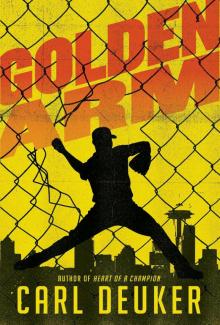 Golden Arm
Golden Arm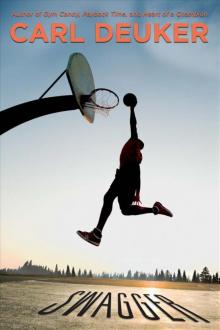 Swagger
Swagger Gym Candy
Gym Candy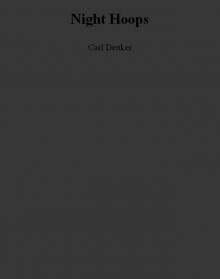 Night Hoops
Night Hoops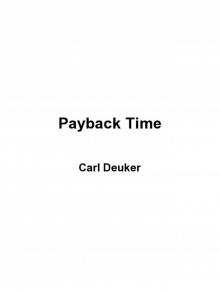 Payback Time
Payback Time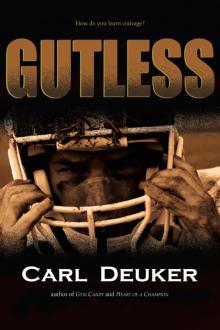 Gutless
Gutless Runner
Runner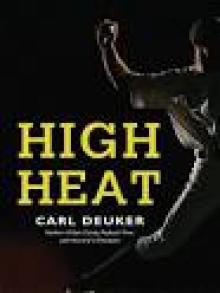 High Heat
High Heat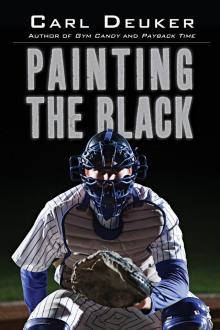 Painting the Black
Painting the Black